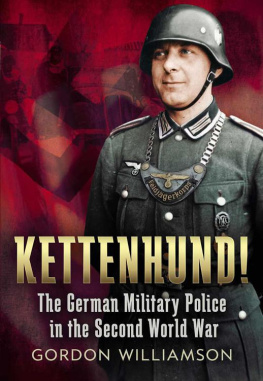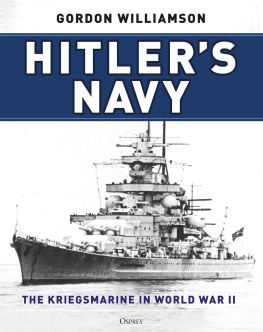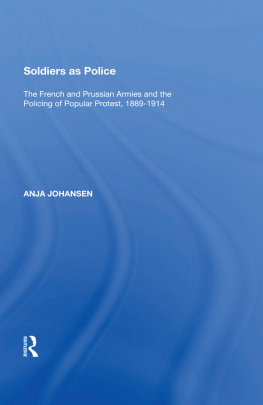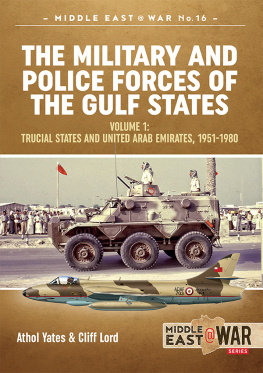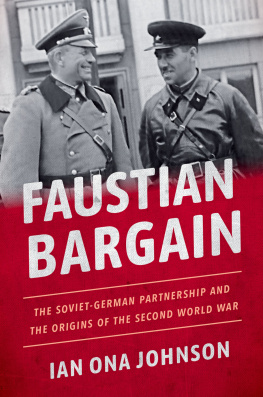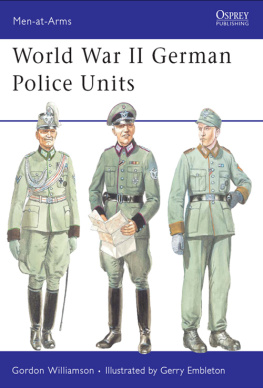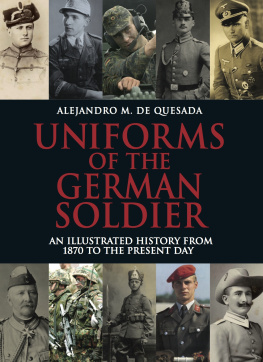
Frontispece above: Having removed his cap, note the clean head of the Feldgendarmerie Hauptmann compared with the rest of his dust caked face during the advance into Russia, summer 1941.
Frontispece below: A Feldgendarmerie NCO escorting a large column of Soviet prisoners.
Fonthill Media Limited
Fonthill Media LLC
www.fonthillmedia.com
First published in the United Kingdom and the United States of America 2014
British Library Cataloguing in Publication Data:
A catalogue record for this book is available from the British Library
Copyright Gordon Williamson 2014
ISBN 978-1-78155-332-9
The right of Gordon Williamson to be identified as the author of this work has been
asserted by him in accordance with the Copyright, Designs and Patents Act 1988.
All rights reserved. No part of this publication may be reproduced, stored in a retrieval
system or transmitted in any form or by any means, electronic, mechanical, photocopying,
recording or otherwise, without prior permission in writing from Fonthill Media Limited
Typeset in 10 pt on 13 pt Gill Sans
Printed and bound in England
Contents

A Feldgendarmerie Unteroffizier carrying out a check on the rear lights of a naval staff car. (Josef Charita)

Unit mechanics service the motorcycles of a Feldgendarmerie Trupp.
Acknowledgements
My father served with the Provost Company of the famed Scottish unit 51 (Highland) Division, seeing service in North Africa and Italy and landed with the Division in Normandy in June 1944.
Having developed a passionate interest in history and in particular military history at an early age, the fact that my father had served throughout World War Two with the Corps of Military Police no doubt influenced my taking a particular interest in that branch of the military. Eventually, having moved to a city with a local Military Police unit of the Territorial Army, I took the opportunity to join and spent most of the 1980s with the Royal Military Police.
This gave me the opportunity not only to experience life as a military policeman, albeit on a part-time basis, but also to travel to Europe during military exercises and meet the military police personnel from our Nato allies. These experiences included a highly enjoyable attachment to a unit of the Feldjger, the military police of the German Bundeswehr. During that attachment I was particularly interested in the attitude of some of these modern German military policemen to their wartime predecessors. Despite the fact that it was not politically correct to show to much interest in the Third Reich, most were fascinated to see photos of some of the Feldgendarmerie artefacts in my collection.
Unfortunately, at that time very little had been published on then subject and I thus began to collect information for myself from a wide variety of sources.
Study of published sources such as the Heeresverordnungsbltter (Army Regulation Sheets) and their airforce and naval equivalents, Heeresdienstvorschrift (Army Service Regulations) and Allgemeine Heeresmitteilungen German Army Gazette all provided detailed information on regulations relating to the military police whilst surviving copies of the Feldgendarmerie Vorschrift (Military Police Regulations) revealed the duties and tasks which these troops were expected to perform.
Even trade periodicals for uniform outfitters, such as Uniformenmarkt, reveal announcements regarding insignia being introduced.
Documents known as the Kriegsstrkenachweisung were consulted for the authorised tables of equipment and manpower for each type of unit whilst existing databases of the Feldpost ( field post ) numbers allocated to military units, though not complete, were a useful tool for cross referencing Feldgendarmerie units which existed.
It addition, study of original examples of the Wehrpass (Military Pass) and Soldbuch (Paybook) belonging to Feldgendarmen proved to be a mine of information.
Last but not least, I am grateful to members of the militaria collecting community for making available so many photographs, both wartime shots and those of surviving examples of Ordnungstruppe ephemera.
I am also grateful to a number of German veterans who contributed information on their experiences in, and encounters with, the Feldgendarmerie. Without all of their help, this book would not have been possible.
Erwin Bartmann +
David Bunch
Gary Chambers
Josef Charita
Clyde R. Davis
Ludwig Dinger +
Sebastian Golawski
Heinz Heuer +
Kevin Huckfield
Ian Jewison
Herbert E. Kail
Henner Lindlar
Oskar Lsel +
Peter von Lukacs
Robert Noss
George Peterson
Scott Pritchett
Bill Shea
Brecht Schotte
Walter Spiller
Wim Saris
Christoph Schultz
Willi Schumacher
Gottfried Schwittalla +
Otto Spronk
Hans Sturm +
Jan Arne Straete
Bart Verstraeten
Peter Whamond
Helmut Weitze
Gary Wood
Introduction
It is probably true to say that in almost any of the Worlds armies, the least popular troops in the eyes of the regular soldier will be that nations military police. Many servicemen seem to feel that the military police serve no other purpose than to make life difficult for them, conveniently forgetting that without the military police to plan and sign supply routes, defend vulnerable points, provide convoy escorts and a myriad of other essential tasks, the soldiers life would be far more difficult and dangerous.
Many of the greatest soldiers of all time have been quoted complimenting the service provided by these little loved troops. Perhaps one of the most telling of such comments was made by Field Marshal Bernard L. Montgomery in 1945 when, talking of the momentous battle for Normandy in the summer of 1944 he said:
The Battle of Normandy and subsequent battles would not have been won but for the work and co-operation of the Provost on the traffic routes.
But what of Germanys military police? Like Great Britain and other countries, Germanys military police have had a long history, much of it perfectly honourable. It must be said however, that whatever the military achievements of the Feldgpndarmere, from 1939 to 1945 they, along of course with every other German soldier, served the Nazi regime. Along with every other branch of the military, there would have been those who served with honour, whilst others who fully believed in the ideals of the Third Reich were certainly less hesitant to become involved in war crimes and instances are documented of Feldgendarmerie units assisting SS and security troops in atrocities, particularly during anti-partisan actions.
The study of the operational activities of individual units however is beyond the scope of this work the purpose of which is to describe the organisational structure of the many military police type units best described as

